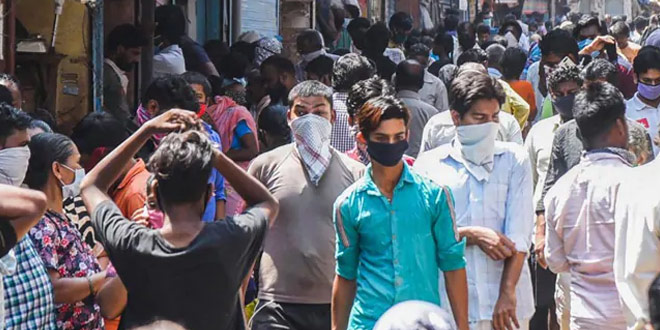Highlights
- Only 9 per cent households had oximeters: Survey
- There is a need to raise Covid awareness among vulnerable sections: Study
- Many people lack basic medical equipment to fight Covid: Survey
New Delhi: Preparedness levels of India’s urban poor and rural population remain abysmally low when dealing with COVID infection at a household level, a survey conducted by research organisation Sambodhi revealed. Significantly, the survey observes that many urban poor and rural population households lack basic medical equipment to gauge vital health parameters related to COVID. “Only 9 per cent households had oximeters while a dismal 3 per cent had access to oxygen cylinders. Also, only 40 per cent of respondents were aware of medical suppliers/shops nearby to access in case they had COVID symptoms,” the study says.
Also Read: US Study Finds COVID-19 Patients With Malnutrition At A Higher Risk Of Death
Conducted in July 2021 in 10 states, the survey shows that among 7,116 households only around 20 per cent had thermometers and about 50 per cent had drugs available to treat symptoms like fever, headaches. In 10 states namely Uttar Pradesh, Jharkhand, Maharashtra, Chhattisgarh, Odisha, Madhya Pradesh, Tamil Nadu, Bihar, Gujarat, Rajasthan people are largely uninformed about newer variants of COVID-19 virus and the associated symptoms.
The respondents also showed a lack of understanding on when to hospitalize a Covid positive person. About 35 per cent of the respondents said that patients should be hospitalised at the onset of the first symptom, while 18 per cent were of the view that a Covid positive result was reason enough to get the person admitted in a hospital.
“It seems that there is a need to increase information dissemination among vulnerable sections of society on newer Covid variants, associated symptoms and recommended treatment protocols, so that people take appropriate measures,” said Swapnil Shekhar, Co-Founder, Sambodhi.
In a positive outcome the survey shows that around 88 per cent are aware of homecare for Covid patients along with 70 per cent of respondents said they had arrangements for isolating Covid positive family members and 76 per cent said they would be able to make food arrangements.
(Except for the headline, this story has not been edited by NDTV staff and is published from a syndicated feed.)
NDTV – Dettol Banega Swasth India campaign is an extension of the five-year-old Banega Swachh India initiative helmed by Campaign Ambassador Amitabh Bachchan. It aims to spread awareness about critical health issues facing the country. In wake of the current COVID-19 pandemic, the need for WASH (Water, Sanitation and Hygiene) is reaffirmed as handwashing is one of the ways to prevent Coronavirus infection and other diseases. The campaign highlights the importance of nutrition and healthcare for women and children to prevent maternal and child mortality, fight malnutrition, stunting, wasting, anaemia and disease prevention through vaccines. Importance of programmes like Public Distribution System (PDS), Mid-day Meal Scheme, POSHAN Abhiyan and the role of Aganwadis and ASHA workers are also covered. Only a Swachh or clean India where toilets are used and open defecation free (ODF) status achieved as part of the Swachh Bharat Abhiyan launched by Prime Minister Narendra Modi in 2014, can eradicate diseases like diahorrea and become a Swasth or healthy India. The campaign will continue to cover issues like air pollution, waste management, plastic ban, manual scavenging and sanitation workers and menstrual hygiene.
[corona_data_new]















